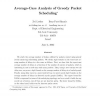Free Online Productivity Tools
i2Speak
i2Symbol
i2OCR
iTex2Img
iWeb2Print
iWeb2Shot
i2Type
iPdf2Split
iPdf2Merge
i2Bopomofo
i2Arabic
i2Style
i2Image
i2PDF
iLatex2Rtf
Sci2ools
109
click to vote
MST
2002
2002
Average-Case Analysis of Greedy Packet Scheduling
We study the average number of delays suffered by packets routed using greedy (work conserving) scheduling policies. We obtain tight bounds on the worst-case average number of delays in a few cases as follows. First, we show that the wprst-case average number of delays is a function of the number of sources of packets, which is interesting in case a node may send many packets. Then, using a new concept we call delay race, we prove a tight bound on the average number of delays in a leveled graph. Finally, using delay races in a more involved way, we prove nearly-tight bounds on the average number of delays in directed acyclic graphs (DAGs). The upper bound for DAGs is expressed in terms of the underlying topology, and as a result it holds for any acyclic set of routes, even if they are not shortest paths. The lower bound for DAGs, on the other hand, holds even for shortest paths routes. A preliminary version of this paper appeared in Proc. 19th ACM Symp. on Principles of Distributed C...
Average Number | Delays | MST 2002 | Tight Bound |
| Added | 22 Dec 2010 |
| Updated | 22 Dec 2010 |
| Type | Journal |
| Year | 2002 |
| Where | MST |
| Authors | Zvi Lotker, Boaz Patt-Shamir |
Comments (0)

